Verbal Communication Principles and Language Effects Analysis
VerifiedAdded on 2022/08/23
|6
|1307
|19
Essay
AI Summary
This essay delves into the significance of verbal communication within business management, emphasizing the crucial role it plays in conveying information and strategic decisions. It discusses various principles of verbal messages, such as the subjective nature of meaning, the importance of denotative and connotative understanding, politeness, assertiveness, and the potential for deception. The analysis extends to how language, including body language and gestures, can impact the communication process, potentially distorting the intended message. Furthermore, the essay provides actionable strategies for enhancing communication effectiveness, including focusing on the issue, active listening, careful framing of messages, and maintaining eye contact. The conclusion underscores the necessity of adhering to verbal communication principles and implementing recommended strategies to ensure clear and effective communication within organizations.
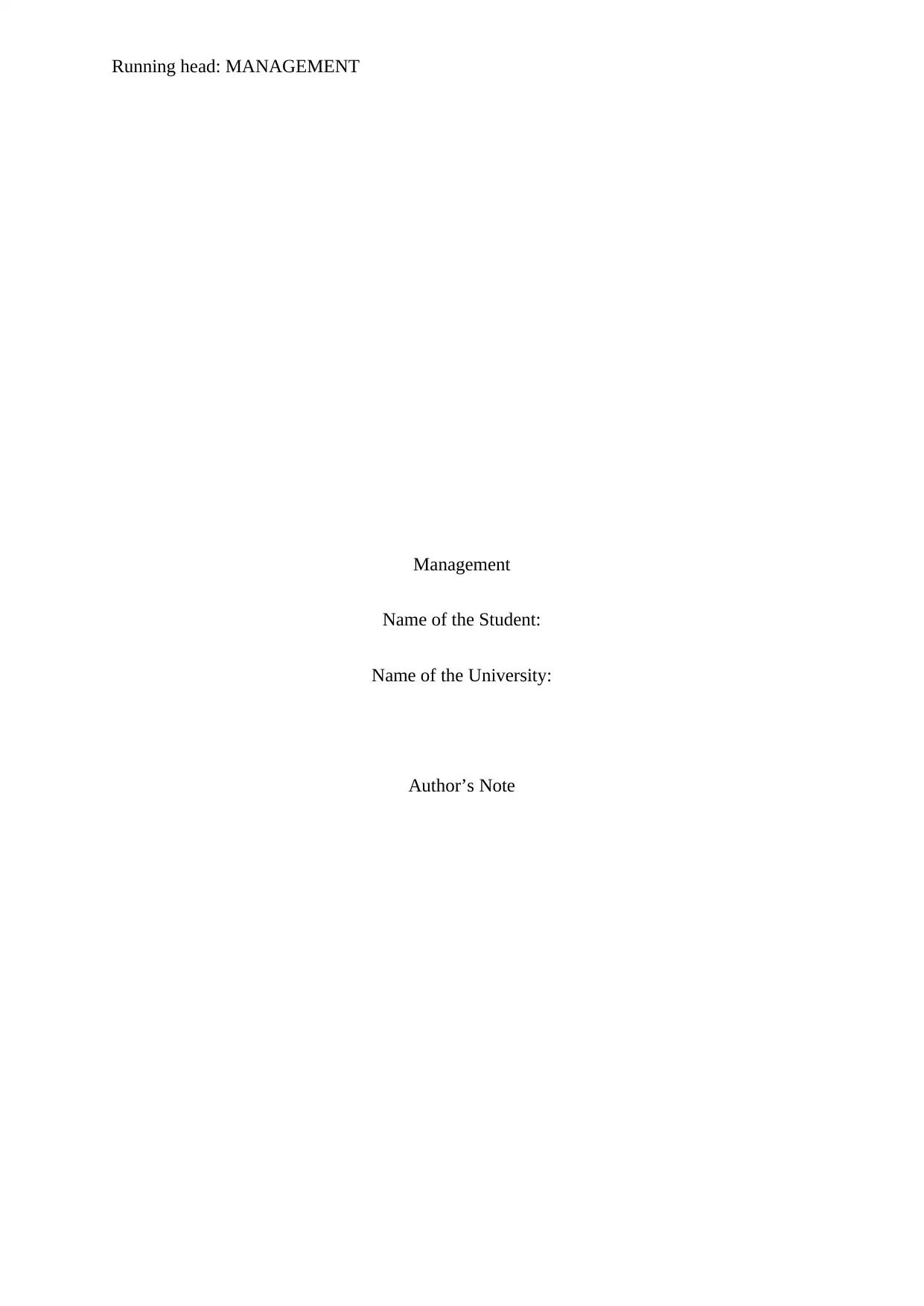
Running head: MANAGEMENT
Management
Name of the Student:
Name of the University:
Author’s Note
Management
Name of the Student:
Name of the University:
Author’s Note
Paraphrase This Document
Need a fresh take? Get an instant paraphrase of this document with our AI Paraphraser
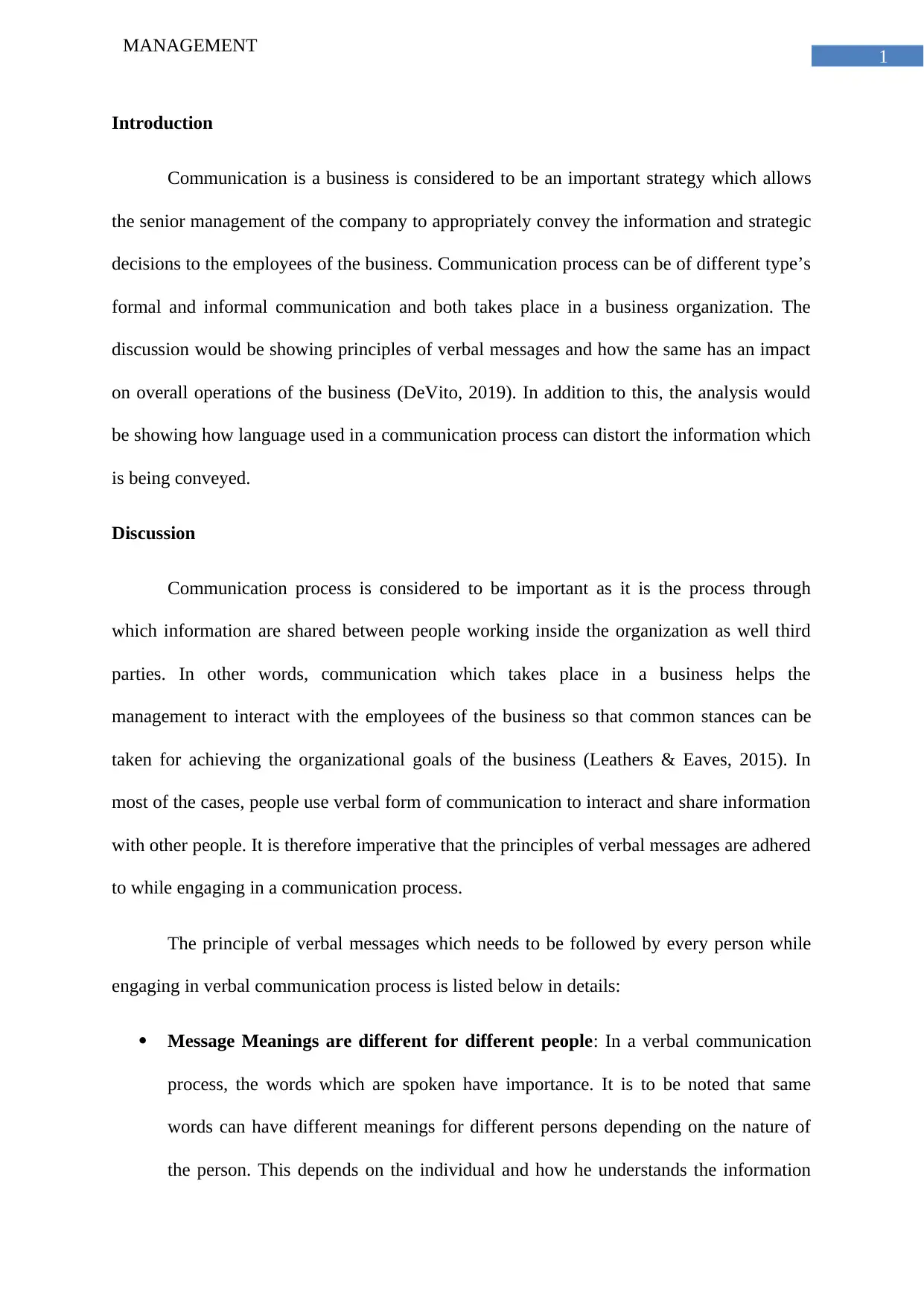
1
MANAGEMENT
Introduction
Communication is a business is considered to be an important strategy which allows
the senior management of the company to appropriately convey the information and strategic
decisions to the employees of the business. Communication process can be of different type’s
formal and informal communication and both takes place in a business organization. The
discussion would be showing principles of verbal messages and how the same has an impact
on overall operations of the business (DeVito, 2019). In addition to this, the analysis would
be showing how language used in a communication process can distort the information which
is being conveyed.
Discussion
Communication process is considered to be important as it is the process through
which information are shared between people working inside the organization as well third
parties. In other words, communication which takes place in a business helps the
management to interact with the employees of the business so that common stances can be
taken for achieving the organizational goals of the business (Leathers & Eaves, 2015). In
most of the cases, people use verbal form of communication to interact and share information
with other people. It is therefore imperative that the principles of verbal messages are adhered
to while engaging in a communication process.
The principle of verbal messages which needs to be followed by every person while
engaging in verbal communication process is listed below in details:
Message Meanings are different for different people: In a verbal communication
process, the words which are spoken have importance. It is to be noted that same
words can have different meanings for different persons depending on the nature of
the person. This depends on the individual and how he understands the information
MANAGEMENT
Introduction
Communication is a business is considered to be an important strategy which allows
the senior management of the company to appropriately convey the information and strategic
decisions to the employees of the business. Communication process can be of different type’s
formal and informal communication and both takes place in a business organization. The
discussion would be showing principles of verbal messages and how the same has an impact
on overall operations of the business (DeVito, 2019). In addition to this, the analysis would
be showing how language used in a communication process can distort the information which
is being conveyed.
Discussion
Communication process is considered to be important as it is the process through
which information are shared between people working inside the organization as well third
parties. In other words, communication which takes place in a business helps the
management to interact with the employees of the business so that common stances can be
taken for achieving the organizational goals of the business (Leathers & Eaves, 2015). In
most of the cases, people use verbal form of communication to interact and share information
with other people. It is therefore imperative that the principles of verbal messages are adhered
to while engaging in a communication process.
The principle of verbal messages which needs to be followed by every person while
engaging in verbal communication process is listed below in details:
Message Meanings are different for different people: In a verbal communication
process, the words which are spoken have importance. It is to be noted that same
words can have different meanings for different persons depending on the nature of
the person. This depends on the individual and how he understands the information
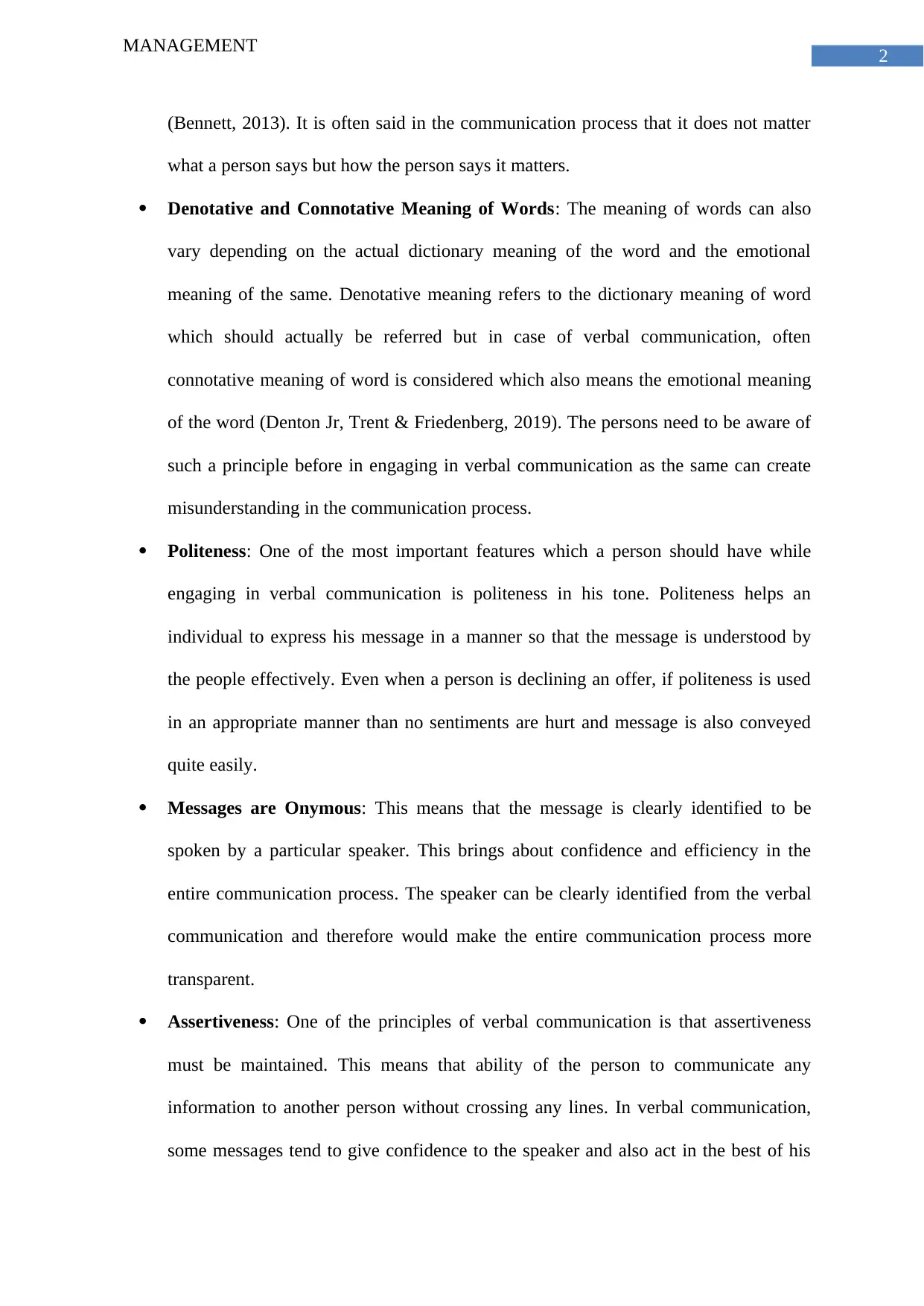
2
MANAGEMENT
(Bennett, 2013). It is often said in the communication process that it does not matter
what a person says but how the person says it matters.
Denotative and Connotative Meaning of Words: The meaning of words can also
vary depending on the actual dictionary meaning of the word and the emotional
meaning of the same. Denotative meaning refers to the dictionary meaning of word
which should actually be referred but in case of verbal communication, often
connotative meaning of word is considered which also means the emotional meaning
of the word (Denton Jr, Trent & Friedenberg, 2019). The persons need to be aware of
such a principle before in engaging in verbal communication as the same can create
misunderstanding in the communication process.
Politeness: One of the most important features which a person should have while
engaging in verbal communication is politeness in his tone. Politeness helps an
individual to express his message in a manner so that the message is understood by
the people effectively. Even when a person is declining an offer, if politeness is used
in an appropriate manner than no sentiments are hurt and message is also conveyed
quite easily.
Messages are Onymous: This means that the message is clearly identified to be
spoken by a particular speaker. This brings about confidence and efficiency in the
entire communication process. The speaker can be clearly identified from the verbal
communication and therefore would make the entire communication process more
transparent.
Assertiveness: One of the principles of verbal communication is that assertiveness
must be maintained. This means that ability of the person to communicate any
information to another person without crossing any lines. In verbal communication,
some messages tend to give confidence to the speaker and also act in the best of his
MANAGEMENT
(Bennett, 2013). It is often said in the communication process that it does not matter
what a person says but how the person says it matters.
Denotative and Connotative Meaning of Words: The meaning of words can also
vary depending on the actual dictionary meaning of the word and the emotional
meaning of the same. Denotative meaning refers to the dictionary meaning of word
which should actually be referred but in case of verbal communication, often
connotative meaning of word is considered which also means the emotional meaning
of the word (Denton Jr, Trent & Friedenberg, 2019). The persons need to be aware of
such a principle before in engaging in verbal communication as the same can create
misunderstanding in the communication process.
Politeness: One of the most important features which a person should have while
engaging in verbal communication is politeness in his tone. Politeness helps an
individual to express his message in a manner so that the message is understood by
the people effectively. Even when a person is declining an offer, if politeness is used
in an appropriate manner than no sentiments are hurt and message is also conveyed
quite easily.
Messages are Onymous: This means that the message is clearly identified to be
spoken by a particular speaker. This brings about confidence and efficiency in the
entire communication process. The speaker can be clearly identified from the verbal
communication and therefore would make the entire communication process more
transparent.
Assertiveness: One of the principles of verbal communication is that assertiveness
must be maintained. This means that ability of the person to communicate any
information to another person without crossing any lines. In verbal communication,
some messages tend to give confidence to the speaker and also act in the best of his
⊘ This is a preview!⊘
Do you want full access?
Subscribe today to unlock all pages.

Trusted by 1+ million students worldwide
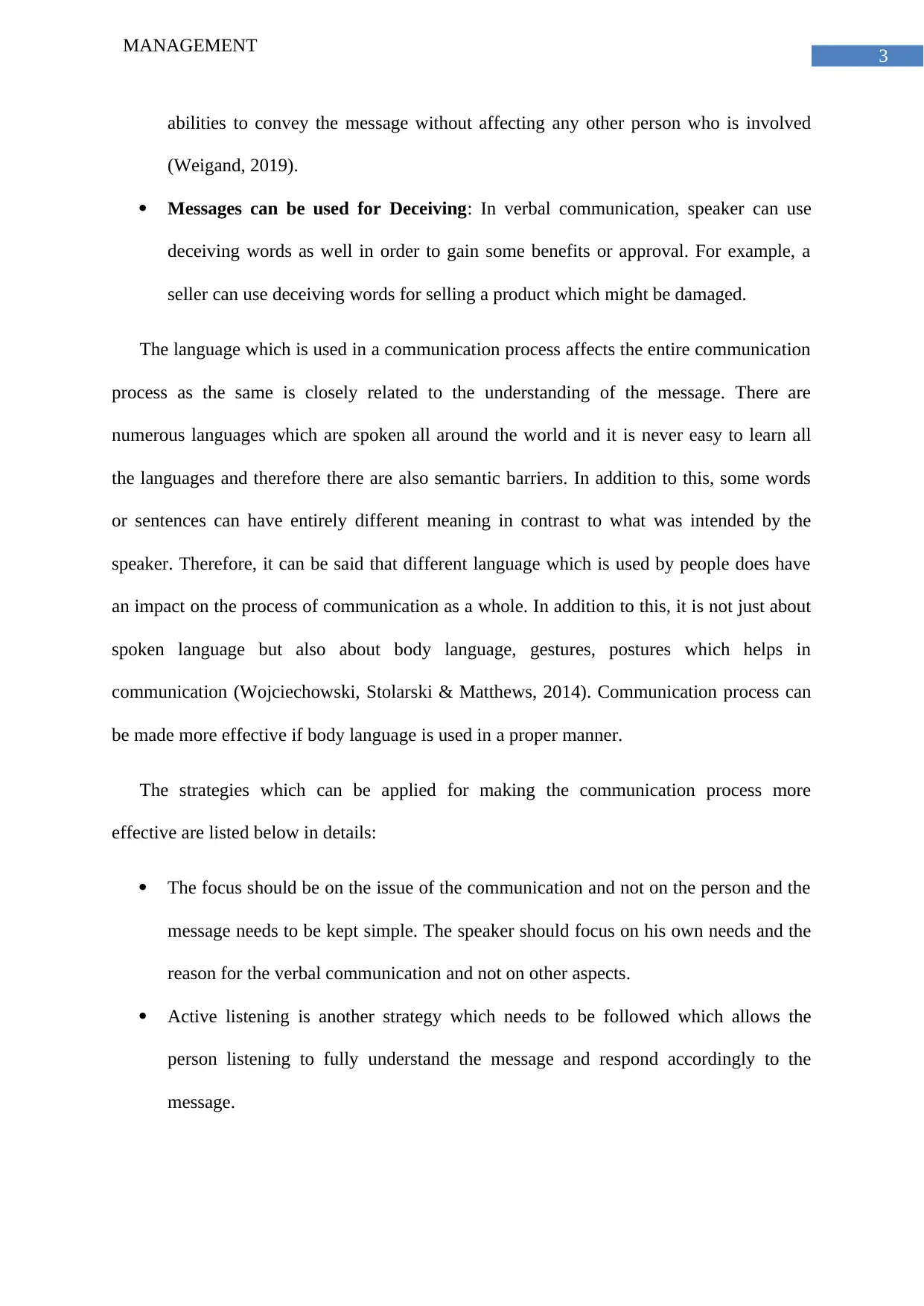
3
MANAGEMENT
abilities to convey the message without affecting any other person who is involved
(Weigand, 2019).
Messages can be used for Deceiving: In verbal communication, speaker can use
deceiving words as well in order to gain some benefits or approval. For example, a
seller can use deceiving words for selling a product which might be damaged.
The language which is used in a communication process affects the entire communication
process as the same is closely related to the understanding of the message. There are
numerous languages which are spoken all around the world and it is never easy to learn all
the languages and therefore there are also semantic barriers. In addition to this, some words
or sentences can have entirely different meaning in contrast to what was intended by the
speaker. Therefore, it can be said that different language which is used by people does have
an impact on the process of communication as a whole. In addition to this, it is not just about
spoken language but also about body language, gestures, postures which helps in
communication (Wojciechowski, Stolarski & Matthews, 2014). Communication process can
be made more effective if body language is used in a proper manner.
The strategies which can be applied for making the communication process more
effective are listed below in details:
The focus should be on the issue of the communication and not on the person and the
message needs to be kept simple. The speaker should focus on his own needs and the
reason for the verbal communication and not on other aspects.
Active listening is another strategy which needs to be followed which allows the
person listening to fully understand the message and respond accordingly to the
message.
MANAGEMENT
abilities to convey the message without affecting any other person who is involved
(Weigand, 2019).
Messages can be used for Deceiving: In verbal communication, speaker can use
deceiving words as well in order to gain some benefits or approval. For example, a
seller can use deceiving words for selling a product which might be damaged.
The language which is used in a communication process affects the entire communication
process as the same is closely related to the understanding of the message. There are
numerous languages which are spoken all around the world and it is never easy to learn all
the languages and therefore there are also semantic barriers. In addition to this, some words
or sentences can have entirely different meaning in contrast to what was intended by the
speaker. Therefore, it can be said that different language which is used by people does have
an impact on the process of communication as a whole. In addition to this, it is not just about
spoken language but also about body language, gestures, postures which helps in
communication (Wojciechowski, Stolarski & Matthews, 2014). Communication process can
be made more effective if body language is used in a proper manner.
The strategies which can be applied for making the communication process more
effective are listed below in details:
The focus should be on the issue of the communication and not on the person and the
message needs to be kept simple. The speaker should focus on his own needs and the
reason for the verbal communication and not on other aspects.
Active listening is another strategy which needs to be followed which allows the
person listening to fully understand the message and respond accordingly to the
message.
Paraphrase This Document
Need a fresh take? Get an instant paraphrase of this document with our AI Paraphraser
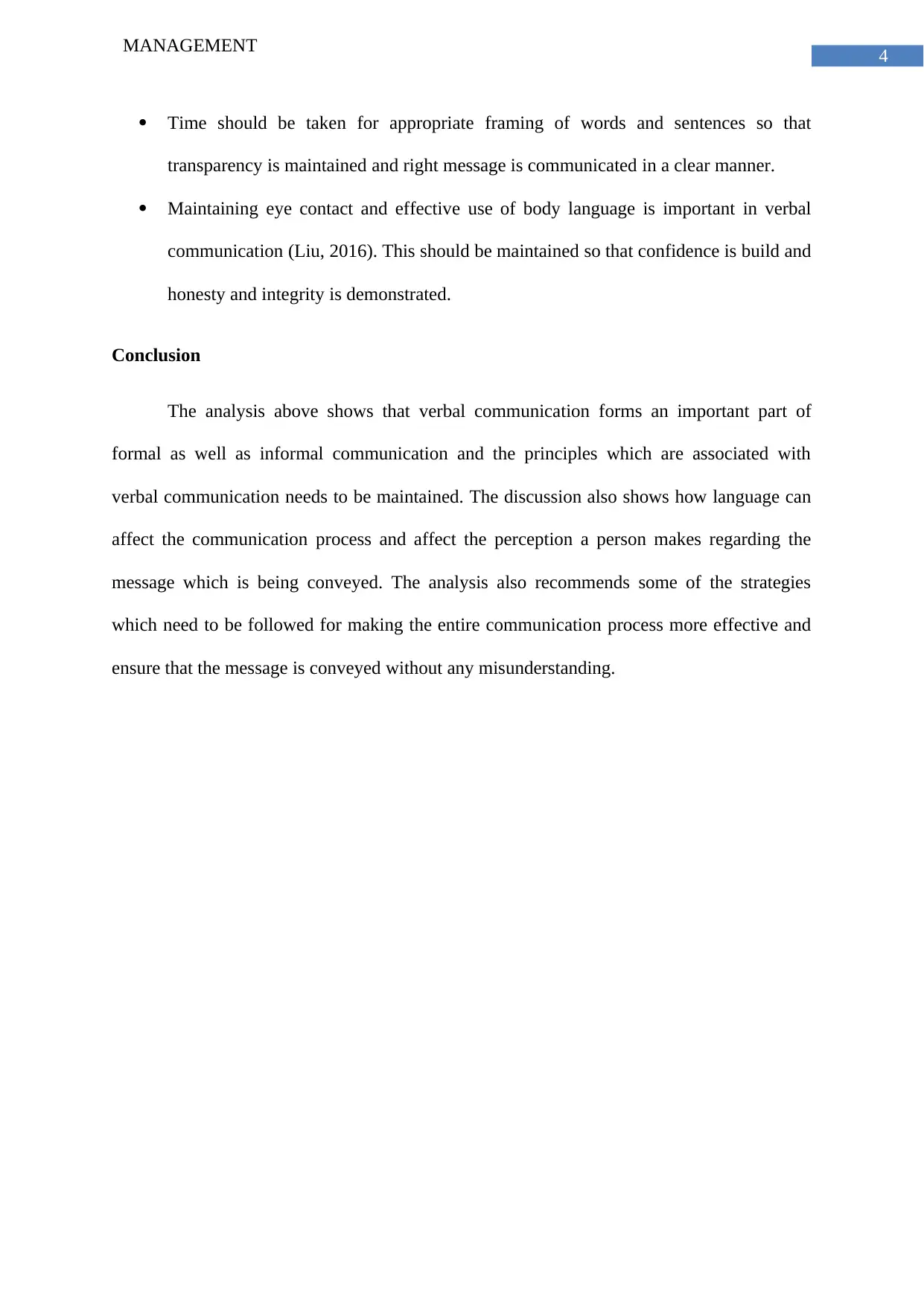
4
MANAGEMENT
Time should be taken for appropriate framing of words and sentences so that
transparency is maintained and right message is communicated in a clear manner.
Maintaining eye contact and effective use of body language is important in verbal
communication (Liu, 2016). This should be maintained so that confidence is build and
honesty and integrity is demonstrated.
Conclusion
The analysis above shows that verbal communication forms an important part of
formal as well as informal communication and the principles which are associated with
verbal communication needs to be maintained. The discussion also shows how language can
affect the communication process and affect the perception a person makes regarding the
message which is being conveyed. The analysis also recommends some of the strategies
which need to be followed for making the entire communication process more effective and
ensure that the message is conveyed without any misunderstanding.
MANAGEMENT
Time should be taken for appropriate framing of words and sentences so that
transparency is maintained and right message is communicated in a clear manner.
Maintaining eye contact and effective use of body language is important in verbal
communication (Liu, 2016). This should be maintained so that confidence is build and
honesty and integrity is demonstrated.
Conclusion
The analysis above shows that verbal communication forms an important part of
formal as well as informal communication and the principles which are associated with
verbal communication needs to be maintained. The discussion also shows how language can
affect the communication process and affect the perception a person makes regarding the
message which is being conveyed. The analysis also recommends some of the strategies
which need to be followed for making the entire communication process more effective and
ensure that the message is conveyed without any misunderstanding.
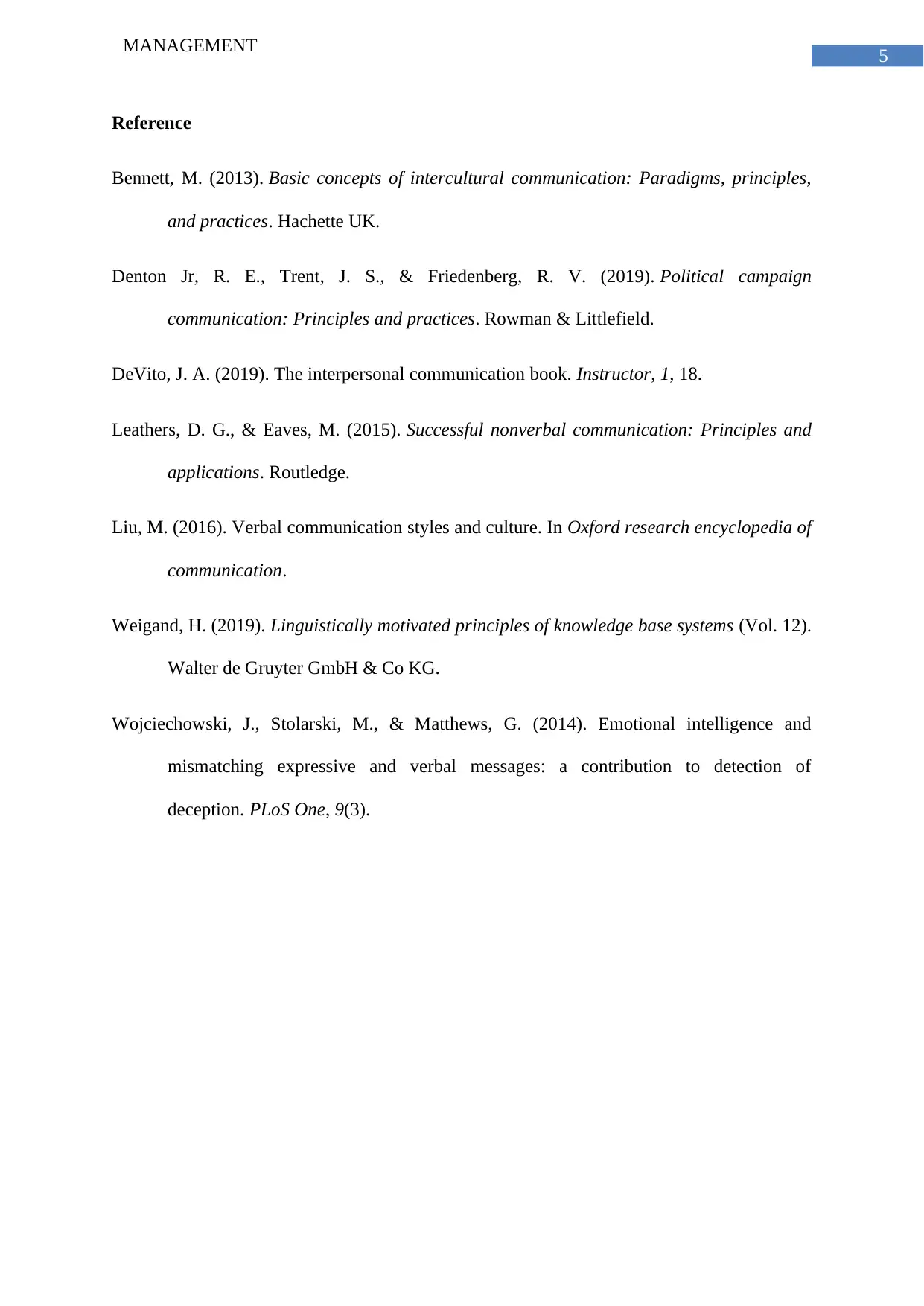
5
MANAGEMENT
Reference
Bennett, M. (2013). Basic concepts of intercultural communication: Paradigms, principles,
and practices. Hachette UK.
Denton Jr, R. E., Trent, J. S., & Friedenberg, R. V. (2019). Political campaign
communication: Principles and practices. Rowman & Littlefield.
DeVito, J. A. (2019). The interpersonal communication book. Instructor, 1, 18.
Leathers, D. G., & Eaves, M. (2015). Successful nonverbal communication: Principles and
applications. Routledge.
Liu, M. (2016). Verbal communication styles and culture. In Oxford research encyclopedia of
communication.
Weigand, H. (2019). Linguistically motivated principles of knowledge base systems (Vol. 12).
Walter de Gruyter GmbH & Co KG.
Wojciechowski, J., Stolarski, M., & Matthews, G. (2014). Emotional intelligence and
mismatching expressive and verbal messages: a contribution to detection of
deception. PLoS One, 9(3).
MANAGEMENT
Reference
Bennett, M. (2013). Basic concepts of intercultural communication: Paradigms, principles,
and practices. Hachette UK.
Denton Jr, R. E., Trent, J. S., & Friedenberg, R. V. (2019). Political campaign
communication: Principles and practices. Rowman & Littlefield.
DeVito, J. A. (2019). The interpersonal communication book. Instructor, 1, 18.
Leathers, D. G., & Eaves, M. (2015). Successful nonverbal communication: Principles and
applications. Routledge.
Liu, M. (2016). Verbal communication styles and culture. In Oxford research encyclopedia of
communication.
Weigand, H. (2019). Linguistically motivated principles of knowledge base systems (Vol. 12).
Walter de Gruyter GmbH & Co KG.
Wojciechowski, J., Stolarski, M., & Matthews, G. (2014). Emotional intelligence and
mismatching expressive and verbal messages: a contribution to detection of
deception. PLoS One, 9(3).
⊘ This is a preview!⊘
Do you want full access?
Subscribe today to unlock all pages.

Trusted by 1+ million students worldwide
1 out of 6
Related Documents
Your All-in-One AI-Powered Toolkit for Academic Success.
+13062052269
info@desklib.com
Available 24*7 on WhatsApp / Email
![[object Object]](/_next/static/media/star-bottom.7253800d.svg)
Unlock your academic potential
Copyright © 2020–2025 A2Z Services. All Rights Reserved. Developed and managed by ZUCOL.





